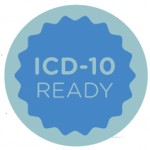Learning the new code structure will be a big transition, Dr. King says. “Some of the nomenclature that goes with the codes is not what we’re used to, and it’s not as intuitive as ICD-9. … For some diseases, instead of one code, there may be many codes to explain a single disease. There’s not always a one-to-one code conversion; it can be one to many or one to one, and that’s certainly challenging.”
The ACR has taken numerous actions to try to mitigate the burden of ICD-10 implementation on physicians, including offering training programs and workshops at various meetings nationwide, publishing online resources and information, and promoting legislation to protect physicians. In the legislative arena, the ACR signed a resolution passed at the American Medical Association’s November 2014 meeting to skip the implementation of ICD-10 and move directly to ICD-11, which is slated to begin beta testing in 2015.

Dr. Harvey
Additional legislative work has continued, and ACR representatives spent all winter 2014–2015 working on proposed legislation. As a result, H.R. 2240 was introduced by Rep. Black (R-TN) in May. Dr. Harvey says the legislation has two components. First, it “requires CMS to offer end-to-end testing for anyone who wants [it] and [certify] to Congress that the system performs as well as the current one in terms of rate of denied claims; and next, [it establishes] a safe harbor period that prevents rejection of claims based on inaccurate subcode detail.”
The safe harbor period has been part of legislative efforts for over a year now. On Feb. 12, 2014, the AMA sent a letter to then Secretary of Health and Human Services Kathleen Sebelius, urging the CMS to reconsider ICD-10 implementation. One point was to encourage CMS to adopt a policy for Medicare that provides an “implementation” period during which payment cannot be denied on the basis of the ICD-10 code specificity.
“We’re hoping there will be some period of time—ideally 18 months—where you use the ICD-10 code and you have to get the main part of the code right, but this specificity part we can get a pass for a period of time where we’re not held responsible for honest mistakes related to that,” Dr. Harvey explains.
Editor’s note: Since this article was written, the CMS has acted on the requests of the ACR and others and announced a one-year grace period during which it will not deny claims on the basis of incorrect ICD-10 sub-codes, so long as the correct family of codes is used. It also made some other concessions. See the related news.

